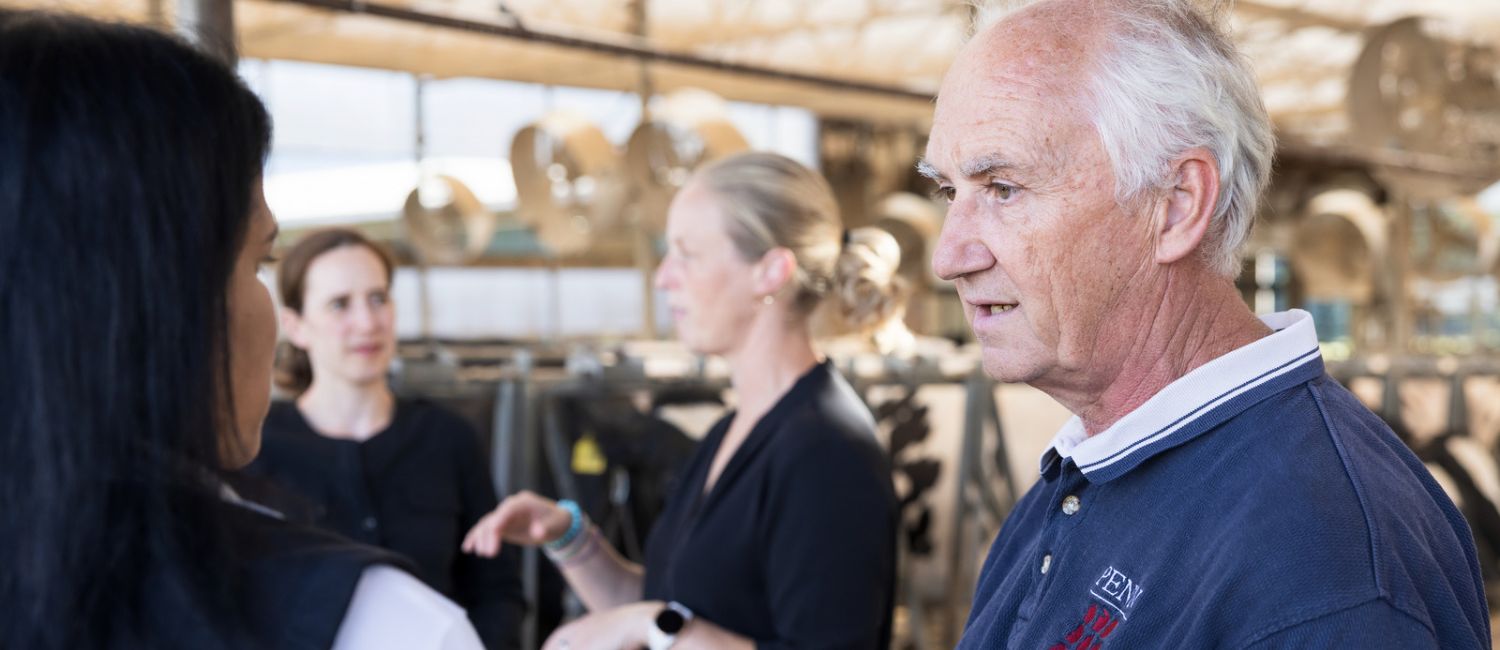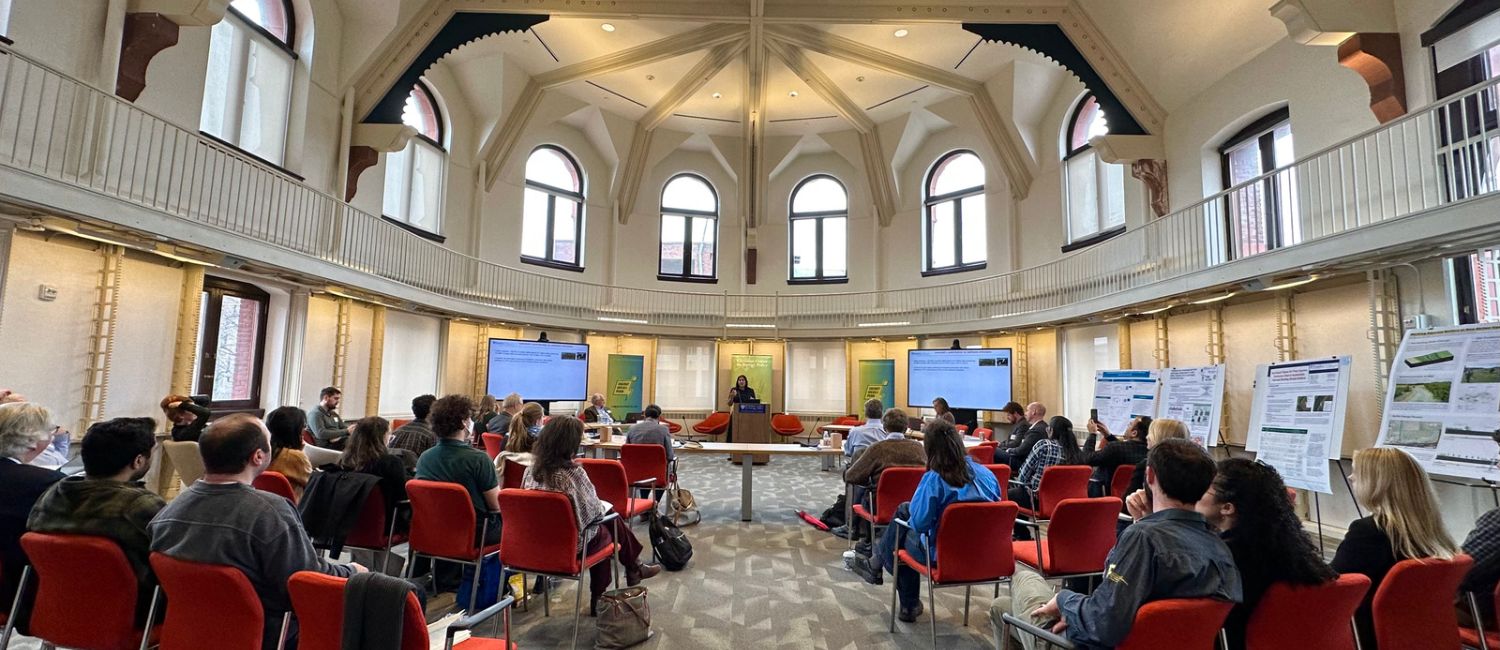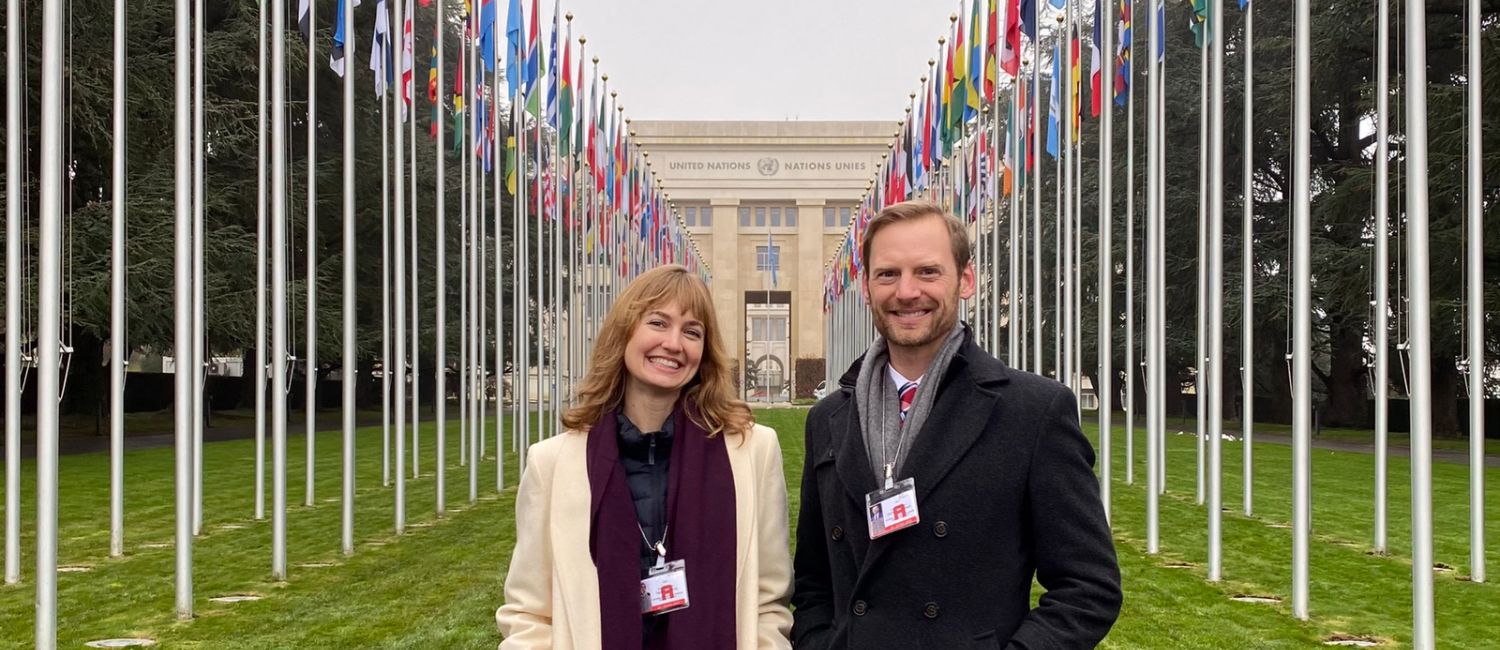 Thomas Parsons of the School of Veterinary Medicine co-leads one of the Environmental Innovations Initiative’s research communities, on regenerative agriculture. The Initiative support synergizes with Penn Vet’s Center for Stewardship Agriculture and Food Security.
Thomas Parsons of the School of Veterinary Medicine co-leads one of the Environmental Innovations Initiative’s research communities, on regenerative agriculture. The Initiative support synergizes with Penn Vet’s Center for Stewardship Agriculture and Food Security.
The Environmental Innovations Initiative announces a third round of funded research communities to catalyze interdisciplinary research at Penn, investigating issues from regenerative agriculture to project-based learning for global climate justice.
How can teachers in Uganda equip their students with tools to confront water sanitation and hygiene challenges? What do farmers need from academics to build a livelihood that’s sustainable from both an economic and an environmental standpoint?
Answering these questions—and many others related to environmental challenges—requires interdisciplinary collaboration. To build those teams, Penn’s Environmental Innovations Initiative has a funding mechanism to encourage cross-school, cross-departmental collaborations, which they call “research communities.”
“We established the research communities to be something like research projects but more open, collaborative, and public-facing,” says Kathleen Morrison, faculty co-lead of the Initiative and a faculty member in the School of Arts & Sciences’ Department of Anthropology. “All of them address issues related to our mission of climate action, stewardship of nature, and societal resilience, but every group approaches the challenge of the climate emergency in a different way.”
The first three research communities were selected in 2021. In 2022, the number expanded to four. This year, in the program’s third iteration, six communities received support: two that were renewed from the second cohort and four new efforts.
The Environmental Innovations Initiative provides startup funding to spur engagement across disciplines in one or more of three areas: stewardship of nature, climate action, or societal resilience. In the selection process, the Initiative prioritizes projects that aim to address challenges with social, cultural, or political dimensions. Each project is also required to have a public-facing outcome and to involve students in meaningful ways.
Ag Alliance
Thomas Parsons of the School of Veterinary Medicine co-leads one research community that received renewed funding this year, the Penn Regenerative Ag Alliance, together with Mark Alan Hughes of the Kleinman Center for Energy Policy. The team includes faculty in the Kleinman Center, Penn Vet, the School of Engineering and Applied Science, the School of Arts & Sciences, and Penn Global.
 Members of an Environmental Innovations Initiative research community and others joined together in March at the Regenerative Ag Alliance Workshop, held in the Kleinman Energy Forum during Penn’s Energy Week in March. (Image: Ashley Hinton/Penn Vet)
Members of an Environmental Innovations Initiative research community and others joined together in March at the Regenerative Ag Alliance Workshop, held in the Kleinman Energy Forum during Penn’s Energy Week in March. (Image: Ashley Hinton/Penn Vet)
Regenerative agriculture distinguishes itself by practices that don’t just avoid degradation of the environment but in fact improve soil and ecosystem health.
Funding for the Alliance coincided with the creation of the Penn Vet Center for Stewardship Agriculture and Food Security, which shares a goal of building connections across campus around how agriculture can be part of the solution to climate change and environmental harms, rather than a contributor to these ills.
Over the last year, Parsons and Hughes have gathered experts in soil health, such as Zhengxia Dou from Penn Vet and Alain Plante from Penn Arts & Sciences, to turn attention to how agriculture can incorporate best practices on farms and reinvigorate degenerated soils. In work with Ellen Neises and colleagues at Penn’s Weitzman School of Design, they’re also exploring the use of riparian buffers on farms, areas along streams or other waterways that are planted with trees, shrubs, and other plants to protect water quality and provide wildlife habitat. They’re working with Penn Engineering’s Peter Psarras at the Clean Energy Conversions Lab to consider the role of farms in carbon capture, as well as Engineering’s Cherie Kagan and Rahul Mangharam to collaborate on technological applications for regenerative agriculture. And they’ve engaged Tom Daniels and Nicholas Pevzner of Weitzman in discussions about how the renewable energy industry—think solar farms—poses both a challenge and an opportunity to traditional farms.
Faculty members and students came together during Energy Week at Penn in a public workshop to report on some their ag-related work and its intersections. Keynote speakers Jane Zelikova, executive director of Colorado State University’s Soil Carbon Solutions Center, and Beth Hoffman, a journalist and regenerative farmer from Iowa, spurred discussion; seven Penn faculty members gave presentations; and a poster session put student research on display.
“We created a lot of opportunity for interaction,” Parsons says. “That’s the end goal, to try to create a space where we can find commonality and foster interdisciplinary research in this area. All of these different schools bring unique perspectives and expertise, so our aim is to try to synthesize those perspectives and have an impact.”
In the coming year, the alliance hopes to plan a second workshop and other interactive offerings, such as a monthly seminar series and podcast miniseries. They’re also working on opportunities to get researchers and students into the field to see agricultural challenges and opportunities firsthand.
Global Climate Justice
Project-Based Learning for Global Climate Justice is another research community entering its second year of funding. Led by Zachary Herrmann, executive director of the Graduate School of Education’s Center for Professional Learning, and Taylor Hausburg, the Center’s teacher program lead, this research community is developing programming and resources to support educators in engaging students in learning that puts them in the driver’s seat when it comes to climate change and sustainability challenges.
“This is a project we had been conceiving for some time, drawing on the expertise that GSE has in project-based learning and the University’s expertise in climate change and climate justice,” Herrmann says. “We thought that the research community could be a great catalyst to spark conversations that bring these bodies of experience together.”
 Taylor Hausburg and Zachary Herrmann of the Graduate School of Education presented on their Project-Based Learning for Global Climate Justice program, supported in part by the Environmental Innovations Initiative, at an international conference the United Nations headquarters in Geneva last year. (Image: Courtesy of Zachary Herrmann)
Taylor Hausburg and Zachary Herrmann of the Graduate School of Education presented on their Project-Based Learning for Global Climate Justice program, supported in part by the Environmental Innovations Initiative, at an international conference the United Nations headquarters in Geneva last year. (Image: Courtesy of Zachary Herrmann)
“Climate is often not taught about enough, or with the right approach,” Herrmann says. “In education we often see the transmission model, where a teacher stands in front of the classroom and delivers content to students. This is not an effective way to grapple with an issue like climate change.”
Project-based learning, which involves students in knowledge-building, real-world, problem-solving activities, “is a remarkably ambitious and powerful approach to teaching and learning and remarkably challenging to do well,” says Herrmann. Equipping teachers to feel confident deploying such methods has been a longtime strength of GSE. Justice is also a central tenet of the School’s mission, so formulating a project around climate justice seemed a natural fit for the research community.
After receiving the initial support from the Initiative last spring, Herrmann and Hausburg reached out to members of the Penn and Philadelphia communities to guide their planning, including GSE colleagues Andrea Kane, Abby Reisman, and Rand Quinn; climate scientist Michael Mann; Water Center executive director Howard Neukrug; and German language professor Simon Richter. Their conversations helped inform the knowledge that teachers would need and the types of projects and justice outcomes they might strive for in their classrooms.
Herrmann and Hausburg and their team engaged 100 teachers from 20 countries. The virtual program brought participants together to explore what projects might best engage their students and how to enact them. Throughout the fall semester, small groups, facilitated by Penn GSE students, met monthly online to share their successes and challenges. In January they arranged a showcase for teachers to highlight the outcomes of their projects.
“Some of the best moments of the global collaboration happened during the design sprint, and educators were brainstorming literally hundreds of possible projects, reading and commenting on each other’s ideas,” Hausburg says. “What we’ve heard from the student facilitators is that, even though these teachers are working in very different contexts, many of their challenges were very similar. Those conversations were very fruitful and validating that, regardless of the context they’re in, they’re in the same boat.”
In this second year of support from the Initiative, together with support just awarded from a Penn Global Engagement Grant, the team hopes to expand programming, hosting an in-person design sprint at Penn in the fall and one or two others at international locations through the year. The funding will also help support a website to share Penn’s project-based learning efforts more broadly, conveying examples of how teachers have put their learnings into action in their classrooms.
“For example, we’re featuring the work of one educator in Pennsylvania, Karen Shaffran, who taught her students about fast fashion and guided them through the process of creating their own upcycled fashion looks and putting on a fashion show,” Hausburg says. “Another educator in Uganda, Isaac Surundu, noted the importance of water hygiene and cleanliness and guided students in thinking about filtration and sanitation systems. We’ve seen incredible examples of this sort of work happening and we are hoping the website is one way we can amplify this great work our partner teachers are doing.”
Four new research communities
In addition to the Regenerative Ag Alliance and Project-Based Learning for Global Climate Justice, the four other research communities funded by the Initiative this year are:
- One Health @ Penn led by Penn Vet’s Jennifer Punt;
- Public Deliberation on Climate Transitions and Well-Being led by Steven Kimbrough of Wharton and Rand Quinn of GSE;
- Symbiotic Architecture for Environmental Justice: Bioremediation and Education with Mycelium-Plant Living Materials in Philadelphia led by Laia Mogas-Soldevila of the Weitzman School of Design; and
- Understanding Climate Anxiety and Messaging in Climate Change Communication in Understudied Populations Among Philadelphia-Area Middle and High Schoolers led by Michael Mann of the School of Arts & Sciences and Annenberg School for Communication.
“We’re getting lots more good proposals than we can fund, which I think suggests the degree of energy and passion at Penn for protecting our planet and its inhabitants,” Morrison says.
Taylor Hausburg is teacher program lead in the Center for Professional Learning at the University of Pennsylvania Graduate School of Education.
Zachary Herrmann is the executive director of the Center for Professional Learning in Penn’s Graduate School of Education.
Kathleen Morrison is faculty co-lead of the Environmental Innovations Initiative and the Sally and Alvin V. Shoemaker Professor of Anthropology and chair in the School of Arts & Sciences’ Department of Anthropology at Penn.
Thomas Parsons is the Marie A. Moore Professor of Animal Welfare and Ethics and professor of swing production medicine at the University of Pennsylvania School of Veterinary Medicine.